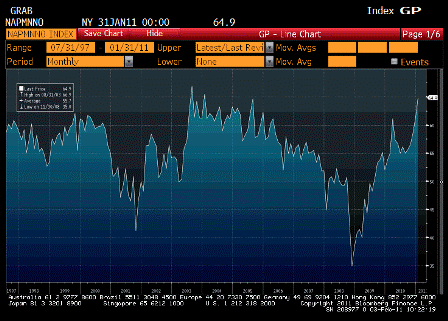>
> (email exchange)
>
> Hi Warren,
>
> Do you have any thoughts on Stiglitz calling for a new reserve currency?
> Is this something you see as a problem or is Stiglitz getting it wrong?
>
Yes, my advice for Joe is to stop talking about these things entirely.
He’s in it all way over his head.
By John Detrixhe and Sara Eisen
April 10 (Bloomberg) — The world economy needs a new global reserve currency to help prevent trade imbalances that are reflected in the national debt of the U.S., said Nobel-prize winning economist Joseph Stiglitz.
He doesn’t seem to grasp the notion that imports are real benefits and exports real costs, nor that the national debt is nothing more than dollar balances in Fed securities accounts that are ‘paid back’ by debiting the securities accounts and crediting reserve accounts, also at the Fed. No grandchildren writing checks involved.
A “global system” is needed to replace the dollar as a reserve currency and help avoid a weakening of U.S. credit quality, said Stiglitz, a professor at Columbia University in New York.
There is no such thing as weakening the ability of the US to make US dollar payments. All that’s involved is crediting reserve accounts at the fed.
The dollar fell to an almost 15-month low against the euro last week, and the U.S. trade deficitwidened more than forecast in January to the highest level in seven months.
“By taking off the burden of any single country, we don’t have to have trade deficits,” Stiglitz said in an interview in Bretton Woods, New Hampshire.
He just assumes there’s some problem with a nation running trade deficits, not realizing it’s a sign of success- improved real terms of trade- and not failure.
“Things would be much worse if it were not the case that Europe was having even more of a problem, but winning a negative beauty pageant is not the way to create a strong economy.”
The benchmark 10-year Treasury note yield was at 3.58 percent on April 8, below the average of 7 percent since 1980.
Deficits per se obviously don’t drive up interest rates.
“Reserves are IOU’s,” Stiglitz said. “When IOU’s get big enough, people start saying maybe you’re not a good credit risk. Or at least, they would change in their sentiment about credit risk.”
Doesn’t matter with a currency issuer like the US, Japan and UK.
Japan’s ‘debt’ is nearly 3x ours, has had multiple downgrades, and their 10 year rate just ‘skyrocketed’ to about 1.3%, for example.
The existing monetary system means “there’s a very good risk of an extended period of low growth, inflationary bias, instability,” Stiglitz said.
Agreed, because nations don’t realize that their taxes function to regulate their aggregate demand, and not to raise revenue per se. And seems Stiglitz doesn’t get it either.
It’s “a system that’s fundamentally unfair because it means that poor countries are lending to the U.S. at close to zero interest rates.”
It’s unfair for a lot of reasons, except that one.


